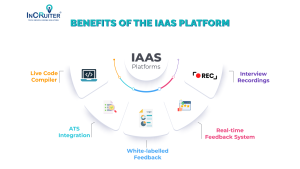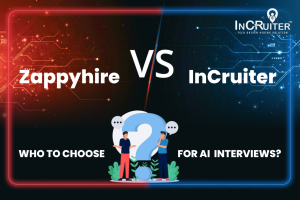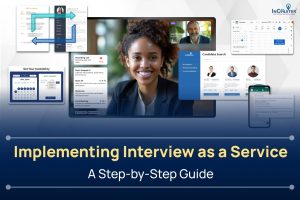
Exit interviews are like the final checkpoint before an employee waves goodbye. Think of them as the ultimate “spill the tea” session for organizations to figure out what’s really going on. Why are employees leaving? Is it the work vibe, a better gig, or something else entirely?
Hiring new people costs way more than keeping the good ones around. That’s why this service is pure gold: they help you pinpoint issues, tweak what’s not working, and build a workplace people don’t want to leave. But here’s the real question: who’s the best person to handle them?
Also Read: Exit Interview: Top 5 Questions You Must Ask
Who should conduct exit interviews?
Sometimes, organizations prefer to conduct final goodbye interviews themselves. But these days, a lot of (ex-)employees are hesitant about in-house exit interviews. The reason being they do not want to be confronted or blamed. It is found out that companies conducting internal exit interviews only see a participation rate of around 15 to 20%.
This significantly low number cannot help the company to gain valuable insights to improve the organization and the employee attrition rate. On top of that, a lot of time and resources are required to conduct exit interviews. It cannot be executed without proper planning.
If a progressive procedure is not followed, it will just be a waste of resources. Apart from this, the HR department will unnecessarily have a lot on their plate because of the departing employee. Burdening them with a set of exit interviews is not a smart choice. Additionally, the guarantee of it being successful or helpful is negligible.
Also Read: HR Tech startup InCruiter secures ₹11 million funding
Why hire professionals to conduct exit interviews?
Conducting interviews when employees leave is just the start; what truly matters is digging into the feedback and turning it into actionable insights. Without meaningful results, it’s tough for companies to pinpoint problem areas and make improvements.
This process demands a solid strategic plan, from crafting the right questions to analyzing the data and creating constructive feedback. It’s not just about time and effort; it also requires skill and precision.
That’s where third-party experts like InCruiter step in, offering seamless and effective solutions. With years of experience, InCruiter is equipped with all the tools to deliver results that truly make a difference.
What Makes Third-Party Interviews a Game-Changer?
Sometimes, organizations handle interviews with departing employees on their own. However, many (ex-)employees hesitate to participate in such discussions internally, fearing confrontation or blame. This often leads to a low participation rate of just 15-20%.
Such a minimal response makes it tough for companies to gather meaningful insights to tackle attrition. Additionally, conducting these discussions internally demands significant time and resources, requiring careful planning to be effective. Without a structured approach, it’s simply a waste of effort. Plus, overloading the HR team with this task adds unnecessary stress, with no guarantee of achieving useful outcomes.
Also Read: Exit Interviews: Vital for High Attrition Companies
Why hire professionals to conduct exit interviews?
When it comes to exit interviews, just taking the interview won’t suffice. Analyzing the feedback for actionable results is what the company is looking for. And if the results are unsatisfactory, the company won’t be able to identify and work on the problematic areas.
Hence, exit interviews require an effective strategic plan, from listing down the questions to compiling the results to form constructive feedback. It is only after this that the organization can work benefit after the employee leaves. It requires not just a great deal of time and proper execution, but also skill and technique.
Hiring a third-party interview as a service platform like InCruiter will quickly help you gain meaningful results. At InCruiter, all the systems are in place to conduct exit interviews because they have been in the business for years.
Here are some reasons businesses choose to hire InCruiter to conduct exit interviews:
Ready to Transform Your Hiring Process?
Discover how our AI-powered interview platform can streamline your recruitment and find the best candidates faster.
Related Blogs

Top 5 Mock Interview Services in India in 2024
Online mock interviews are essential when you are looking to get your desired job. Whether a fresher or a seasoned professional, mock interview services are...
Synergy of Interview as a Service and Applicant Tracking Systems
Interview as a Service (IaaS) and Applicant Tracking Systems (ATS) work together to optimize hiring, improve efficiency, and eliminate recruitment bottlenecks.

Interview Outsourcing: A Proven Solution for Better Hiring Outcomes
Explore why interview outsourcing is helping companies hire smarter, faster, and more accurately—backed by expert panels and structured evaluations.

Guide to Choosing the Right Interview Scheduling Software
Do you even need interview scheduling software? The answer is yes! And more than 51% of recruiters agree. Today, the competition is at its all-time high....

Smart Hiring 101: Navigating Success with Interview Intelligence Platform
51% of recruiters state that the best candidate is found after three interviews. But imagine the amount of time spent on just one candidate! Each...

Interview Scheduling Tools: Enhancing Candidate Communication with Automation
In the competitive field of talent acquisition, the way candidates are approached might determine whether or not the hiring process turns out effectively. Particularly with...

Top 5 Video Interview Platforms in 2024
If you are a business owner or an HR, you must understand how difficult it can be to interview candidates. Using traditional methods to interview...

What Is Interviewer Fatigue And How To Deal With It?
Do you feel tired and overwhelmed after conducting interviews? Well, it happens to many but can lead to serious damage if not tackled. Interviewer fatigue...

How On-Demand Tech Interviews Benefit Growing Companies
More and more companies today are embracing innovative recruitment practices to stand out. One such approach that makes a mark is the on-demand tech interviews....

How can Interview Outsourcing accelerate your recruitment process?
Time is not just money; it’s everything in the ever-changing corporate terrain. Businesses do everything to surpass their competitors and stay ahead of the curve,...

Interview Scheduling Software: Maximizing Interview Attendance
Are you tired of the endless workload due to arranging and managing interviews due to no-shows of candidates? You are not the only one facing...

Coding Assessment Platform: Improving Developer Screening
Competition is high in the modern world, especially in the technology industry, and it can be quite difficult for you as a HR professional, recruiter...

STAR Interview Method: A Complete Guide with Questions and Sample Answers
What Is the STAR Interview Method? The STAR interview method is a widely used formula for answering behavioral, leadership, conflict-resolution, and problem-solving questions, breaking down...

Top 5 AI Mock Interview Platforms
Explore the top 5 AI-powered mock interview platforms that offer personalized feedback, real-time simulations, and tailored interview preparation for job success.

Top 5 Automated Interview Scheduling Platform used by MAANG
Explore the top 5 interview scheduling platforms used by MAANG companies to streamline hiring, reduce delays, and boost candidate experience.

Flaws You Might Be Having As A Recruitment Agency
Do you see your client retention rate declining and bad word of mouth branding by the jobseekers taking your services? Check out the faults your...

InCruiter Recognized with the 2025 “Best Ease of Use” Award Across Multiple Categories
We are excited to share that InCruiter, an innovative interview management platform, has been recognized with multiple awards, like the 2025 “Best Ease of Use”...

Best Interview Outsourcing Service Providers in 2024
It takes around 41 days to fill a job opening. Do you have the time to spare? It’s mostly a no. That’s why 47% use interview...

The Rise of One-Way Video Interviews: Benefits and Best Practices
No matter how efficiently you’re navigating recruitment in your company, the initial screening process is still intimidating and time-consuming. This is where a one-way AI...

Top 10 Mock Interview Practice and Interview Preparation Websites
Explore the top 5 mock interview websites designed to help students and job seekers practice effectively and gain confidence for real interview success.

AI Interview Bot in Recruitment – How InCruiter is Leading the Way?
Did you know that 52% of talent acquisition leaders report that the most challenging part of recruitment is identifying candidates from a large applicant pool?...

Essential features every Video Interviewing Software should have
Explore the essential features every video interviewing software should have to improve hiring efficiency, reduce bias, and create great candidate experiences.

Impact of Video Interview Software on Campus Hiring
In the realm of campus hiring, video interview software has proven to be a game changer. With so many advancements in technology, it is now...

SparkHire v/s InCruiter- Video Interview Software for Informed Decision Making
In this technology-driven environment where 75% of companies are using video interview software for their hiring. It is essential to have a clear idea about...

How Interview as a Service Will Transform Hiring in 2024?
It’s no secret that hiring the right person for the job is correlated to the growth of your organization. But 75% of employers today say...

Future of AI Interviews in India
Explore how AI interviews are driving the future of hiring in India through automation, personalization, fairness, and industry-specific intelligence.

How to Identify Interview Frauds During the Hiring Process?
It is seen that 30% to 50% of candidates cheat during entry-level job assessments. Are you alarmed yet? If not, you should be.Let’s say you...

How AI Interviews Are Reshaping Hiring Practices in the BPO Sector?
Staffing shortages have been a significant challenge for BPOs, with an average annual attrition rate of 30-35% in the industry. So, when there is a...

Ideal Interview Scheduling Software for Lightning-Fast Hiring
Struggling with interview scheduling? Discover the best online tools to reduce delays, save time, and deliver a smooth candidate experience.

How Augmented AI Can Boost Interview Accuracy?
Learn how Augmented AI improves interview accuracy across every stage—from question generation to unbiased scoring and post-interview insights.

Best Interview as a Service Platforms in 2024
The demand for seamless recruitment processes continues to grow, and interview-as-a-service platform is playing a crucial role in it. Almost 86% of employers believe that...

Benefits of AI-Based Interviews for HR Professionals
We can all agree that this is just the dawn of the artificial intelligence (AI) era. It is here to stay. In fact, its presence...

Video Interview Software- How To Provide Best Interview Feedback?
Do you find it challenging to give feedback to the rejected candidates, and that’s why you skip it? If yes, then you must change your...

Why Interview as a Service Is the Future of Talent Acquisition?
Learn why Interview as a Service is becoming the top choice for faster hiring, expert-led evaluations, and smarter talent acquisition strategies.

Why AI Mock Interviews Are the Future of Interview Prep?
AI mock interviews are revolutionizing interview prep with real-time feedback, practice at scale, and smarter evaluation.

Hire Human Resources from the top Crowdsource Staffing Agencies
Human Resources- Why Employees are Greatest Asset for any Business? And How Recruitment Agencies Support this Statement! People are your greatest asset! You might have...

How to Choose the Right Interview Outsourcing Company in Singapore?
Today, Singapore is one of the fastest-growing job markets across the globe and enjoys a stable employment rate. It has a high demand for skilled...

Interview Outsourcing: The Secret Weapon in High Volume Recruitment
High-volume hiring needs more than just speed. Learn how interview outsourcing helps companies recruit smarter, faster, and with better accuracy.

Video Interview Tools: Streamlining the Interviewing Process
Video interviewing solutions are now one of the most important tools for expediting the hiring process. A video interview system helps you conduct more objective...

Role of Recruitment Industry Post Covid-19
The tenacious times during the lockdown have witnessed many people being laid off from their jobs, and many well-established companies sliding into unforeseen losses, and...

How One-Way Video Interviews Are Transforming The Current Business Scenario?
Are you using one-way video interviews to transform your business scenario? If the answer is no, let’s face it, you are missing out. Where once...

Interview Outsourcing: A Strategic Approach to Talent Acquisition
A company’s success hinges on the caliber of individuals it brings on board. That said, vacant job openings and the scarcity of highly skilled employees...

How AI Interviews Are Shaping Recruitment in the BFSI Industry?
India’s Banking, Financial Services, and Insurance (BFSI) sector has seen immense growth in recent years. According to a recent study, India’s BFSI sector is expected...

Boom Of HR Startups In India
Over the recent years, India has seen an increase in the number of startups in all sectors. One such industry, rightly so, are recruitment agencies....

Interview Scheduling Tools: Optimizing Recruiter Workflow
Interview scheduling tools simplify hiring, save time, and enhance candidate experience. Learn how they can boost your recruitment efficiency.

Video Interviewing: Cost-Effective Hiring Solutions for Startups
As a startup owner, tracking expenses is crucial, as is spending mindfully on the hiring process. What strategies do you swear by to hire the...

InCruiter’s AI Interviewer – How It Stands Out from Other AI Interviewing Platforms?
Explore how InCruiter’s AI Interviewer revolutionizes hiring with two-way AI video interviews, automation, unbiased evaluations, and structured assessments.

BarRaiser V/S InCruiter- Video Interview Software Comparison
In today’s tech-savvy era, video interview platforms have become crucial in the recruitment landscape as they offer a competitive edge. The ease and efficiency they...

Top 10 Interview as a Service Platforms in India
Explore the top 10 Interview as a Service platforms in India, revolutionizing hiring with expert evaluations, automation, and data-driven insights.

Why Outsource Technical Interviews To A Third-party Provider?
The global technical interview outsourcing and related services market is expected to reach $2.2 billion by 2026. This growth is driven by the increasing demand...

Hire Manpower Easily With The Help Of Recruitment Agencies
When it comes to hiring best-skilled candidates, it can be a cumbersome process for an employer or any organization. Generally, organizations are not experts in...

From Screening to Selection: How AI Interview Bots Are Transforming the Hiring Process
AI interview bots are transforming hiring, automating screening, scheduling, and interviews while enhancing efficiency, fairness, and candidate engagement.

Everything You Need to Know About Lateral Hiring
Uncover lateral hiring essentials, including how businesses attract experienced talent quickly, streamline processes, and fill critical roles effectively.

Coding Assessment Platform: Solving Tech Hiring Challenges with Online Coding Tests
Struggling with tech hiring? Learn how online coding assessment platforms help recruiters identify top developers faster, with greater accuracy and ease.

Why Tech Hiring Automation is Vital for All Businesses?
In today’s fast-paced world, HR should stay ahead of automation to streamline HR functions by eliminating laborious manual tasks. Switching HR functionalities from traditional manual...

Top 10 Interview Outsourcing Companies in 2026
The success of any organization depends on its employees. But finding the right candidates is easier said than done. On an average, it can take...

Live Coding Interviews: Revolutionizing Technical Assessments
Learn how live coding interviews and advanced tools transform tech hiring with real-time feedback, reducing bias, and boosting candidate engagement.

Mock Interview for Freshers: Get Ready to Land Your Dream Job
Freshers can now prepare for job interviews with AI-powered mock sessions. Practice real questions, get feedback, and build confidence to land your first job.

Recruitment Automation: What is it and How Does it Work?
With a lack of skilled talent and cutthroat competition in the job market, recruiters find it difficult to find the right talent. Imagine having to...

Top 5 AI Proctoring Tools for Secure Online Assessment and Interviews
With remote exams and virtual hiring becoming the norm, keeping things fair and secure has become harder than ever. Candidates can cheat, switch screens, or...

7 Tips to Choose the Right Technical Interview-as-a-Service Platform
Picture this. You have a vacant position for a technical role that needs to be filled immediately. But, you do not have a subject matter...

3rd Party Exit Interview Services: Turning Departures Into Opportunities
Discover how third-party exit interview services transform employee departures into strategic opportunities to enhance retention and workplace culture.

Applicant Tracking System (ATS) – The Ultimate Tool to Simplify Recruitment
An ATS simplifies hiring by automating resume sorting, interview scheduling, and candidate tracking.

Importance of Interview As A Service In Efficient Recruitment
Many companies today are leaning towards interview as a service for their hiring processes. A 2023 study says 80% of businesses use interview outsourcing platforms...

Interviewer.AI vs. InCruiter: Video Interview Software Comparison
Did you know that 60% of recruiters turn to video technology to interview candidates? This is mainly because of the convenience and ease the platform...

Talview vs. InCruiter: A Video Interview Software Comparison for the Ages
InCruiter and Talview are two top video interview software platforms with features designed to assist organizations in recruiting top talent. However, choosing between them may...

Modernize Hiring By Outsourcing Technical Interview Services?
The recruitment process is a critical component of any organization’s growth and success. However, relying solely y on traditional methods, even in 2023, may not...

Video Interview Tips: Complete Guide to a Successful Interview
Master your next video interview with these expert tips! Learn how to confidently navigate live and pre-recorded formats for the best results.

Real-Time Collaboration: Why Pair Programming Interviews Matter
Pair programming interviews provide a live look into how candidates solve problems, communicate, and adapt, helping companies make better hiring decisions.

How Can AI Interview Software Help Companies with Large Numbers of Applications?
2024 was the year of successful endeavors and employing talented professionals. As most leading businesses in the market, you must be willing to continue the...

Everything You Need to Know About AI Proctoring Software
AI proctoring software ensures cheatproof exams and interviews with real-time monitoring, identity checks, and analytics, safeguarding integrity at scale.

How to Choose the Best Virtual Interview Platform in India?
Now, in 2023, we live in a tech-savvy era where virtual interviews eliminate the constraints of traditional interview processes. In fact, reports show that 40%...

9 Key Benefits of Using a Video Recruitment Platform for Hiring Managers
Are you someone who has used video conferencing platforms like Zoom or Google Meet to conduct interviews? If yes, then you must continue reading as...

Top Interview Scheduling Software in 2026
Do you struggle with scheduling hundreds of interviews and then taking follow-ups on the same? As a recruiter, scheduling interviews is a tiring process and...

What is Interview Outsourcing? Why is it the need of the hour?
Interview outsourcing simplifies hiring by saving time, reducing costs, and delivering top talent through expert-driven, data-backed evaluations.

Streamlining Offboarding with Exit Interview Services
Exit interview services streamline offboarding, offering insights to improve retention and culture, turning departures into growth opportunities.

How AI Mock Interviews help freshers get their first job?
"Freshers, land your dream job with AI mock interviews! Learn how to practice, get feedback, and build confidence for your first job interview."

Say Yes to On-Demand Technical Interview as a Service
Discover how On-Demand Technical Interview Services can transform hiring. Save time, ensure quality, and get expert evaluations for tech roles effortlessly.

Pair Programming Interviews: Examples, Benefits & Best Practices for Technical Hiring
Pair programming interviews enhance technical hiring by focusing on real-time problem-solving, improving decisions, and providing a smoother experience.

Understanding AI Recruiting Software: Features, Benefits, and Impact
Artificial intelligence or AI has interwined itself into various aspects of our lives. Whether it is voice-search devices or smart homes, AI is everything. So,...

AI Interview Platform for Faster Recruitment
Discover how AI-powered interview platforms can speed up your hiring process by 4X, reduce costs by 80%, and ensure a seamless candidate experience.

Everything You Need to Know About Interview as a Service
The recruitment interview process is often lengthy, time-consuming, and laborious. Recruiters spend two-thirds of their hiring time conducting interviews and usually take 30-45 days to...

Python Common Interview Questions
Get ready for your Python interview with this curated list of common questions. Master the basics and advanced topics with expert insights.

Recruitment Process Outsourcing Trends in 2024
From paper-based procedures to AI-backed software, RPO (Recruitment Process Outsourcing) has come a long way, making hiring efficient and cost-effective for recruiters. Businesses are considering...

How Can You Leverage The Growing Interview as a Service Market?
Did you know the growth of the interview as a service platform is said to be 10x in the next 6 years? And this number...

What is One Way Video Interviews: Everything You Need to Know
One way video interviews let applicants record answers to preset questions, helping recruiters screen faster, save time, and improve hiring consistency.

Why Should You Outsource Recruitment For Your Business?
Did you know almost 75% of organizations go through hiring difficulties. Hiring is more demanding than picking the right candidate from a pile of CVs...

Technical Screening Tips: Best Practices, Methods, and Common Mistakes
Learn key technical screening practices and avoid common pitfalls. Discover how advanced tools and smart strategies can elevate your hiring success.

AI Interviews: Myths and Facts
Recruiting the right talent is a tough job, and if you can get extra help, then who wouldn’t like it? That’s why businesses today are...

Wrath of COVID-19 in Recruitment Industry
The wrath of COVID-19 has ensnared the entire world, forcing people to trap themselves in their homes and arrest the outspread of this deadly ailment....

The Upsurge in Employee Moonlighting in the Tech Industry
The Indian IT corporate industry has been abuzz with debates about moonlighting or two-time jobs by employees over the past few weeks. Taking up second...

The Role of Interview Co-Pilot in Transforming Traditional Job Interviews
AI is everywhere, even when it comes to recruitment. For instance, 44% use AI to filter the best candidates with the help of the internet,...

10 Best AI Interview Software
Discover the top 10 AI interview platforms that streamline interviews, enhance decision-making, and improve the hiring process for companies.

Why Should Businesses Consider Recruitment Process Outsourcing?
Did you know 9 out of 10 hiring managers struggle to fill vacant positions? Finding the right candidate is like finding a needle in a...

The Rise of Freelance Interviewer: Meeting Hiring Demands During Peaks
The job market is constantly evolving, and the traditional employment models are being reshaped with new concepts. But even today, on average, 118 candidates apply...

Discussing The Emerging Trends In Tech Talent
The emerging tech industry is running at a speed of global innovation and growth in Tech talent. This boom has created unprecedented opportunities for companies...

Top 10 Video Interview Software for Recruiters
Explore the top 10 video interview software options that make recruitment easier. Streamline your hiring process with the best tools in the market.

What are the Advantages and Shortcomings of Hiring Platforms?
Living in a fast-paced world, the race to find a decent job or upgrade your current position to one with more perks is never-ending. The...

How AI Interviews Transform the Candidate Selection Process
Gone are the days when manual hiring was all the rage. Now we have AI interviews, your new hiring assistant. If you belong to the...

AI Interview Adoption in the Recruitment Process
AI interviews are reshaping recruitment, offering smarter hiring solutions, reducing time-to-hire, and ensuring fair, efficient candidate evaluation.

Nail Your Next Interview with AI Mock Interview Practice
Ace your job interviews with AI-powered mock interview practice. Get instant feedback, refine your answers, and walk into interviews with confidence.

AI Interview Tools: Choosing the Right Solution for Your Hiring Needs
If you are a hiring manager, then you have every right to be muddled, given the multiple AI interview tools available in the market. In...

Level Up Your Hiring: Why Technical Interview as a Service is a Game-Changer
Leverage Technical Interview as a Service to streamline hiring, reduce costs, and secure top tech talent with faster, structured, and unbiased evaluations.

Video Interview Software That Combines AI Insights with Human Touch
Discover how AI-powered video interview software enhances recruitment by combining automation with accurate human evaluation for smarter hiring decisions.

Why Pair Programming Interviews are Better than Traditional Coding Tests?
Explore why pair programming interviews are transforming tech hiring, assessing both technical and soft skills essential for collaborative teams.

Interview as a Service: Shaping the Future of Hiring
With the evolving job market, recruiting talented candidates has become more challenging than ever. Traditional recruitment processes often involve lengthy procedures, which result in delayed...

Machine Learning Common Interview Questions
Get ahead in your machine learning interviews with key questions, and expert insights. Learn the critical concepts that will help you excel in your next...

Interview as a Service: Unlocking the Potential to Hire a Techie in Just 2 Days!
Are you tired of sorting and conducting interviews of hundreds of job applications for weeks or months, searching for the perfect tech candidate for your...

Code Collaboration Video Interview Platforms Explained
Explore how code collaboration video interview platforms bring real-time coding, video interaction, and accurate evaluation to modern tech hiring processes.

Why Should You Outsource Technical Interviews?
When it comes to recruitment, hiring for technical jobs is not as straightforward. It can be a time-consuming and expensive chore as finding the right...

How do you Develop a Successful Talent Acquisition Strategy for Startups?
There is a famous quote by Lawrence Bossidy, “Nothing we do is more important than hiring people. At the end of the day, you bet...

How Mock Interview Online Can Help You Ace Your Next Job Interview?
AI-powered mock interviews help boost confidence and refine interview skills. Get real-time feedback and expert guidance to ace your next job interview.

Hire Top Talent From Crowdsource Staffing Companies
The success mantra of any enterprise could be always a result of extraordinary talent! The right human resources for any business will make or break...

Best Practices for Evaluating Candidates Using Video Interview Software
A survey revealed that 47% use video interview software to shorten the hiring timeframe. Are you doing it too? We are in an era where...

How AI is Leveling the Playing Field in Employment!
Automated employment decision tools are software systems that are designed to assist employers with making hiring, promotion, or other employment-related decisions using artificial intelligence and...

Pre-Employment Checks: Hiring the Right Candidates
A disastrous hire can adversely affect the business growth levels. Nowadays, there has been a drastic increase in fake candidates in the corporate sector, which...

Integrating Live Coding Interview Tools for Better Hiring
Integrate live coding interview tools to streamline technical hiring, enhance candidate assessment, and improve hiring efficiency with real-time coding evaluations.

Integrating Online Mock Interviews into Campus Recruitment Strategies
Just like everything in the world, the way interviews are conducted is also getting updated. So, as an institute, the first step is enhancing interview...

Calendly v/s InCFeed: The Best Interview Scheduling Software
The recruitment industry is constantly evolving with technological advancements. Today, almost 51% of recruiters rely on interview scheduling software to simplify the process. Online interview...

How Interview Outsourcing Improves Time-to-Hire Metrics?
Interview outsourcing solves time-to-hire challenges by automating scheduling, handling logistics, and providing expert interviewers for faster, efficient hiring.

How is the Exit Interview Process Essential for Companies?
Whenever the employee tenders their resignation to the company, each following process, if done appropriately, leads to the closure of the terms between the employee...

How AI Recruitment Software is Transforming the Candidates Hiring Experience?
AI is like oxygen. “It’s pervasive and crucial for both securing top talent for open positions and ensuring their long-term retention.” Do you sometimes feel...

Why your hiring funnel fails without the right Video Interview Software?
Is your hiring funnel failing? Without the right video interview software, you may be missing top talent. Discover how to fix it today!

How are companies benefiting from the IaaS platform?
With employment numbers rising, businesses and companies are preparing for a large-scale hiring initiative. But, as recruiting demands continue to grow let us ask this,...

How AI Interviews Can Improve Your Company’s ROI (Return on Investment)?
There is a famous quote by Ronda Katz “ Wise spending is part of wise investing.” When you are a business owner, it is essential...

Why Code Pairing Interviews Are essential for finding the top developers?
Code pairing interviews are transforming tech hiring. Learn how they uncover top developers by evaluating problem-solving, teamwork, and cultural fit in real-time.

Technical Hiring Made Easy with Code Collaboration Platforms
Learn how code collaboration platforms transform technical hiring by enabling live coding, fair evaluation, and smarter decision-making for recruiters.

Dos and Don’ts in Interviews: A Comprehensive Guide
Acing interviews is about knowing what to do—and what to avoid. Discover crucial dos and don’ts to help you make a lasting impact on interviewers.

Mastering C++: Top C++ Common Interview Questions and Tips
If you are someone who wants to work as a c++ developer, then going through a c++ coding interview is necessary. With the rise of...

HirePro vs. InCruiter: Cracking the Code of Video Interview Software
Have you heard that you can now take an interview from any place in the world, i.e., no need to go to the office? Yes,...

How AI is Transforming Coding Assessment?
Ever wondered why traditional coding assessments often feel like they’re stuck in the past? For years, they’ve relied heavily on manual grading and rigid test...

How Interview Scheduling Platforms Can Save Recruiters Hours
Scheduling an interview seems very easy. All you have to do is call the candidate, fix the time, and voila! You are done. But unfortunately,...

Why Professionals Should Still Take AI Mock Interviews?
AI mock interviews help professionals enhance clarity, manage time better, and stay ahead in evolving job markets by offering unbiased feedback and insights.

Autonomous Virtual Interviewer: A Game-Changer in Online Interviewing
Hiring teams face delays, fatigue, and uneven reviews. Virtual interviewers fix the early mess by speeding up rounds and keeping things steady.

7 Video Interview Platforms to Look for in 2024
60% of recruiters use video interview platforms to interview candidates, regardless of whether the job is remote. This number is only going up because of...

Best Video Interview Platforms for Startups
According to the World Economic Forum, there are over 250 AI interview tools with many impressive features. Of all the options available, video interview platforms...

Why Universities Are Turning to AI for Assessment Integrity?
Universities are turning to AI surveillance to secure assessments, prevent malpractice, and ensure fair evaluation of student skills.

Zappyhire v/s InCruiter: Who to Choose for AI Interviews?
Once upon a time, someone from the HR department was always glued to the phone trying to schedule the interviews and whatnot! However, with the...

How to Write an Effective Job Description: A Comprehensive Guide?
Master the art of crafting job descriptions. This guide covers everything from key elements to common mistakes, helping you attract the right talent.

Solving Hiring Challenges with Technical Interview Outsourcing
Discover how outsourcing technical interviews helps solve key hiring challenges like bias, skill gaps, and slow timelines in tech recruitment.

5 Biggest Hiring Challenges Faced by Recruiters in 2024
In recent years, the hiring world has seen a massive transformation, from the pandemic, where we saw the adaptation of remote interviews, to artificial intelligence,...

Global Expansion Made Easy with Interview as a Service
Expanding your workforce globally? Interview as a Service helps businesses hire top talent worldwide with structured, expert-led, and scalable interview solutions.

How to Find the Right Developer for Your Startup?
Learn how to find and hire the right developer for your startup. This guide offers practical steps for building your team and achieving success.

HTML Common Interview Questions
Mastering HTML and HTML5 is crucial for web developers. This guide covers 25 commonly asked interview questions to assess both foundational and advanced skills.

Industry specific use cases of Interview as a Service (IaaS)
Hiring isn’t just about finding candidates; it’s about finding the right candidates with the right skills at the right time. Yet, different industries face unique...

How Technical Interview As A Service Improves Hiring?
Do you know that around 117 job applications are submitted every second, just on LinkedIn? Now, you can calculate the applications through other professional platforms,...

Exit Interviews: The New Pathway to Employee Retention
In the current business scenario, employee retention is a bigger problem than ever. Businesses are concerned about employees leaving the organization and want to work...

Recruiter’s Guide to Video Interviewing Software
Let’s say, you are hiring for a crucial role and you have a new seamless video interviewing software to support you. However, you haven’t fully...

Resume Checker vs. Manual Resume Screening – Which Is More Effective?
AI resume checkers streamline hiring, but are they better than human screening? We compare accuracy, efficiency, and effectiveness to find the best method.

What Are the Core Services Offered by an Interview as a Service (IaaS) Provider?
Interview as a Service (IaaS) offers end-to-end solutions, including scheduling, screening, unbiased assessments, data analytics, and expert evaluations.

Land The Perfect Hire: Learn How Interview Outsourcing Supercharges Your Hiring
Have you ever dreamed of having a magic wand that could deliver the perfect candidate almost instantly? Well, a robust interview outsourcing platform is almost...

What is Interview as a Service?
Interview-as-a-service is the next-Gen interview platform to make the interview process smoother using sophisticated technologies. In simple words, it helps a business outsource its interview...

How Do One-Way Video Interviews Work?
Have you ever conducted interviews through Google Meet or Zoom? Did you ever face challenges like lack of coordination between the interviewer and the candidate,...

What Is the Phone Screening Interview Process?
Struggling with early-stage interviews? Discover how the phone screening process helps recruiters filter candidates quickly and make better hiring decisions.

10 Video Interview Tips Every Recruiter Must Know About
According to a survey, almost 82% of employers use video interviews, and 93% plan to continue using them. While video interviews have been around for quite...

Future of Hiring: AI and Chat GPT for Precise Evaluation
Companies constantly seek to enhance their hiring processes and source the best talent for their clients. With the emergence of AI technology and chat GPT,...

Why Are Companies Turning to Interviews as a Service for Enhancing Candidate Experience?
Interview as a Service is reshaping recruitment with expert assessments, flexible scheduling, bias-free evaluations, and timely feedback for a better candidate experience.

The Best AI Recruiting Tools for Every Hiring Manager
The game has changed dramatically in recruitment in the last few years. What used to rely on gut feelings, much of which involves manual efforts,...

10 ways AI Interviews Will Change Tech Recruitment
According to SHRM, 88% of companies are using AI in their human resources department globally. From chatbots to finding relevant company details, identifying top candidates...

World Best Interview as a Service Company in 2025
Discover what makes the best Interview-as-a-Service provider in 2025. Learn how InCruiter excels in technology, scalability, and global hiring.

Exit Interviews: Vital for High Attrition Companies
Employee attrition is one of the two most important metrics when it comes to human resources. Another is employee turnover. In simple words, both of...

5 Best Online Interview Platform for Remote Hiring in 2025
Explore the 5 best online interview platforms in 2025 that are helping companies streamline remote hiring with speed, flexibility, and smarter evaluations.

A Guide to Interview as a Service | Pros & Cons
Onboarding the right candidate is the foundation of a successful organization. But recruitment is more complex than sifting through resumes and picking one candidate. How...

Interview Outsourcing: Scaling Your Hiring Process
The tech talent war is at its peak. A recent study by Forbes revealed that 68% of companies require more than one month to fill...

Using Al Recruiter to Automate Phone Screening Process
AI phone screening is changing recruitment. From candidate profiling to instant reports, learn how this blueprint saves time, reduces bias, and improves hiring outcomes.

Global Expansion Made Easy with Video Interview Software
Video interview software streamlines global hiring, helping businesses expand quickly by accessing top talent worldwide without location barriers.

Why Choose Interview as a Service Over Hiring In-House?
Interview as a Service offers efficiency, scalability, and expertise that in-house hiring can't match. Discover why it's the preferred choice today.

AI Video Interview: Implementing Standardized Evaluation
AI video interviews are revolutionizing hiring by promoting standardized evaluations and minimizing bias. This article explores their benefits for both applicants and organizations.

Relevance of Interview as a Service in the Modern World
Finding suitable candidates for job openings has become more tiring and time-consuming in the rapidly evolving landscape. Traditional interview methods have failed to identify the...

The Benefits of Using Contract Staffing Agency for Employers
Did you know half of all hiring managers intend to increase their use of a contact staffing agency in the next five years? A contract...

How Conversational AI is Powering the Future of Talent Screening?
Conversational AI is redefining how recruiters screen talent—automating interviews, saving time, and delivering better hiring outcomes at scale.

How Interview as a Service Promotes Scalable Hiring Solutions
In today’s fast-paced corporate world, organizations are constantly on the lookout for top talent and scalable hiring solutions. Not getting a suitable solution can often...

What Are AI Interviews? Everything You Need To Know
Today, we live in a tech-savvy era. From AI-driven algorithms bringing us personalized news updates to AI-powered navigation systems, AI is everywhere. It is seamlessly...

Live Coding Interviews vs. Take-Home Assignments: Which One is Better?
Live coding interviews or take-home assignments? Discover the pros, cons, and the ideal scenarios to choose the best format for efficient tech hiring.

Why Every Tech Recruiter Needs a Reliable Coding Assessment Platform?
Online recruitment platforms play a pivotal role in the modern hiring processes for various corporate companies across India. Online recruiting platforms enhance the hiring process...

Top 5 Reasons to Use a Resume Checker Before Job Apply
Discover why a resume checker is essential before applying for jobs. Boost your chances with improved formatting, keyword optimization, and error-free resumes.

Video Interview Software: Enhancing Hiring Accessibility
In today’s competitive employment market, hiring process accessibility is more crucial than ever. Services that are genuinely accessible ensure that every candidate, regardless of their...

How to Set Up and Use One-Way Video Interview Software?
In the hiring world, new tech tools like one-way AI video interview software are making things easier. In the ever-growing landscape of recruitment, technology plays...

Why are Online Mock Interviews Your Way to Go in 2024?
It is 2024, and we can see that hiring practices have majorly shifted online. 74% of recruiters have found that video interviews have made their...

How Big is the Interview-as-a-Service Market Size?
How Big is the Interview-as-a-Service Market Size? The sophisticated modernization of tech-driven technologies like “Interview-as-a-Service” in the HR industry has drastically changed how an organization...

How IT Staffing Companies Are Shaping Careers in Technology?
According to data from the American Staffing Association, the IT staffing companies industry was placing approximately 16 million people per year pre-pandemic. During the pandemic...

Navigating Interviews: A Deep Dive into Virtual Interview Platform
The digital era has transformed the technological landscape so that the job recruitment process has a very new picture drawn. The old concept of traditional...

Top 5 Pair Programming Interview Platforms for Live Coding Interviews
Find the best pair programming platforms for live coding interviews. Simplify technical hiring with tools that enable seamless collaboration and evaluation.

Why Freelance Interviewing is the Ultimate Side Gig for Experienced Professionals?
Freelance Interviewing is an ideal side hustle for professionals seeking flexible, well-paid work that leverages their expertise.

Beyond the Resume: How AI Interview Bots Enhance Screening?
From optimizing your job search to simplifying recruitment for HR, AI is now ready to transform the screening process. The current recruitment is taking a...

Video Interview Software with AI Proctoring to Detect Fraud
AI proctoring is transforming video interviews by detecting fraud in real time using face tracking, voice analysis, and behavioral insights for secure hiring.

Step-by-Step Guide to Setting Up Your Recruitment Process
Follow our comprehensive step-by-step guide to establish an efficient recruitment process. From defining needs to onboarding, optimize your hiring strategy today.

Live Coding Interview Platforms For Recruiters In 2025
Imagine this. You are hiring for a crucial technical role. You conduct several video interviews and find a candidate who seems too good to be...

How Interview as a Service Enhances Diversity and Inclusion Efforts?
Interview as a Service (IaaS) revolutionizes hiring by minimizing bias, promoting inclusivity, and ensuring fair assessments for a diverse workforce.

The Role of Contract Staffing Agency in Shaping Industries
Finding the perfect candidate who aids your growth is not as easy as sifting through a couple of resumes and picking the best one of...

Traditional Interview Assessment vs AI Video Interview: A Comprehensive Comparison
Uncover the key differences between traditional and AI-powered video interviews, and how they influence efficiency, accuracy, and the overall candidate experience.

How AI Chatbots Are Enhancing Candidate Engagement in Recruitment?
AI chatbots are transforming recruitment by providing instant, interactive communication that boosts candidate engagement and improves hiring outcomes.

How to Choose the Best Interview Format for Your Hiring Needs?
In most organizations, recruiters need to experiment with different interview formats in order to find which format works best for them. Whether you’ve adopted Zoom...

Top 5 Online Interview Platforms for Remote Hiring in 2025
Hiring has never been more challenging, especially with remote work taking over. Video interviews, once just a novelty, have become the standard. What was once...

Is contract staffing a new big thing post pandemic?
Yes, contract staffing is a new big thing post-pandemic. Gradually as our country is rising and fighting against this pandemic the employers are starting to retool their...

What Can You Expect From Technical Interview Services?
Did you know that the average time to fill a tech position globally is 42 days? Yes, that’s right, because as of 2023, tech companies...

How AI Mock Interviews Are Transforming Interview Preparation?
Discover how AI-driven mock interviews are revolutionizing interview prep by offering real-time feedback, reducing anxiety, and personalizing practice.

How to Align Job Descriptions with Employer Branding?
Aligning job descriptions with employer branding helps attract the right talent. Showcase your company culture, values, and vision to stand out.

How to Use AI to Prepare for the Interview?
Discover how AI can enhance your interview prep through customized tools for resume building, mock interviews, research, and more to boost confidence and performance.

Understanding Different Interview Rounds for Developer Roles
Understand every stage of developer interviews, from initial screening to final discussions. Get expert tips on how to ace technical and behavioral rounds.

How to Utilize Exit Interview Data for Organizational Improvement?
According to research by Social, only 28% of HR managers act on the data collected by their exit interviews. This statistic seems scary because this...

Importance of Online Interview Management System
Online interviews have become famous for organizations to screen and select candidates in today’s digital age. As the world becomes more interconnected, online interview services...

Why BFSI Hiring Needs a Fresh Approach?
Relying on traditional hiring methods in the Banking, Financial Services, and Insurance (BFSI) sector is leading to significant losses for organizations. Slow, outdated processes fail...

Implementing Interview as a Service: A Step-by-Step Guide
Streamline your hiring process with Interview as a Service! This guide breaks down the steps to implement it effectively for better recruitment outcomes.

The Rise Of On-Demand Interviews- All You Need To Know
Do you often feel you need more flexibility in the interviewing process? If yes, on-demand interviews are the answer. On-demand interviews are a modern recruiting...

Top Recruitment Agencies To Hire Right-Fit
It’s a well-accepted fact that quality hire is one of the key concerns of any organization’s success. The talent acquisition realm has been seen as...

Organizational Culture: Definition, Importance, and Types
Learn how a strong organizational culture at InCruiter drives employee engagement, strengthens brand identity, and supports long-term business growth.

Enhancing Diversity and Inclusion with AI Interview Software
Discover how AI interview software is transforming diversity and inclusion in hiring by reducing biases, creating accessible practices, and expanding candidate pools.

Video Interview Software vs Google Meet: Which Is Better for Remote Hiring?
Choosing the right tool for remote hiring? Dive into the ultimate showdown between Video Interview Software and Google Meet to find your best fit.

How Full-Stack AI-Powered Video Interview Solution Fit Into Every Recruitment Strategy?
Learn how full stack AI interview solutions speed up hiring, enhance candidate quality, and strengthen every step of your recruitment outsourcing strategy.

Recruitment Agencies: Navigating Company Challenges
The Data Predicament A humongous amount of candidates’ data is handled by the recruitment agencies, which are either collected from the job seekers approaching them...

How AI Mock Interviews Help in College Placements?
AI mock interviews help college students ace placements by offering real-time feedback, boosting confidence, and simulating real interview scenarios.

Top 10 Benefits of an Online Mock Interview Practice
Learn how online mock interview practice can help you ace real interviews, boost confidence, and refine skills. Discover the top 10 reasons it’s a must...

Role of Interview Intelligence Platforms in a Positive Candidate Experience
Do you know that 80% of HR leaders believe AI will “fundamentally change” the hiring process in the next few years? Well, it is quite...

What employees won’t tell you until the Exit Interview?
Employees often hold back until their final days. Learn what they really think, what they won’t say until the exit interview, and why it matters.

Top IT Staffing Companies in 2024
The IT market today is fiercely competitive. So, for any organization to stand out, finding the right talent is crucial. It’s not just a one-time...

Interview Scheduling Software: Enhancing Recruitment Efficiency through Automation
Discover how interview scheduling software enhances recruitment efficiency, automating processes and providing seamless scheduling for candidates and recruiters.

Choosing the Right Video Interview Tool for Your Business
Discover how to select the best video interview tool for your business, with insights on features, benefits, and tips to streamline your hiring process.

Best Interview Questions for Data Analysts in 2024
Hiring for a data analyst position is not an easy job, especially in a competitive market. The role of data analysts includes extracting information from...

The Role of Video Interview Software in Modern Recruitment
Are you still using only the traditional hiring methodologies? Well, almost 50% of recruiters are integrating modern practices like video interview software to reduce the...

Top 5 Video Interviewing Tools to Streamline Virtual Hiring
Looking for the best video interviewing tools? Here are the top 5 platforms to make your virtual hiring process smooth, efficient, and AI-powered.

Save Time and Hire Smarter with Interview as a Service Platforms
Forget about the traditional interview processes undertaken by various companies to recruit fresh talents. The traditional interviews are a time-consuming, tiresome, and slow process that...

.NET Common Interview Questions
Prepare for your next .NET interview with this curated list of common .NET questions. Ace your interview by understanding key concepts and best practices.

AI Interview Software: Make Interviews Less Biased
Recruitment and selection have been a subject of bias for a long time because of issues relating to diversity and equity. Though, with the help...

Impact of Interview as a Service on Candidate Quality
Interview as a Service enhances candidate quality by providing expert evaluations, reducing bias, and delivering data-driven hiring decisions.

How to Choose the Right Interview Management System for Your Business?
As a recruiter, have you ever wondered about having an interview system that not only makes interviewing faster but also effective? With several candidates vying...

Hire Next-Gen Developers with an AI-Powered Coding Assessment Platform
Learn how AI-powered coding assessment platforms help organizations hire skilled, innovative developers faster by automating evaluations and streamlining decisions.

The Art Of Interview Analysis: Decision-Making in the Hiring Process
To stay consistent in the current job market, companies must strive to hire the most qualified candidates possible to remain competitive. One effective approach to...

10 Steps to Build a Scalable Recruitment Process in 2025
Learn 10 key steps to build a scalable recruitment process in 2025. Optimize hiring efficiency, attract top talent, and stay ahead in the competitive talent...

Best Recruitment Agencies in Bangalore for Successful Hiring
The Cost of a Bad Hire and How to Avoid It! Multiple organizations spend many hours sourcing applicants, reviewing profiles, interviewing candidates, and have internal...

On-Demand Talent Ecosystem: Pre-Vetted Developers for Scaling Startups
A poor hiring system wastes time, increases costs, and weakens teamwork. Startups need to hire skilled developers quickly, such as Pre-vetted developers. The standard hiring...

Attract Clients: Top Recruitment Agencies for Your Staffing Firm
How Incruiter Helps Recruiters in Finding the Clients? New and retained clients are essential for the survival of any recruitment agency or freelance recruitment consultants. Finding...

How to get a job in Data Science and AI with NO prior experience?
Want to start a career in Data Science or AI but have no experience? This guide covers everything you need to learn and launch your...

Benefits of Integrating Interview Intelligence Platforms in Your Hiring Process
Do you want to embrace the power of the interview intelligence platform in your recruitment process? If you’ve heard this term, then this blog is...

Coding Assessment Tools: Enhancing Skill Verification with Adaptive Testing
A Coding Assessment Platform is a unique software intended to measure the coding abilities of software developers and engineers within a set scenario. Coding assessment...

Why leading enterprises rely on AI Interview Software for DevOps hiring?
Learn how AI interview platforms are helping top enterprises streamline DevOps hiring, improve skill checks, and reduce time to hire across teams.

Top 5 Interview Questions for Virtual Assistant Interviews
Are you hiring a virtual assistant and want to ensure you find the perfect fit? The easy way to do so is by asking the...

Interview-As-A-Service: Why More And More Businesses Are Opting For This
Finding and hiring the right candidate can seem more complex than ever, especially in this competitive job market. Nearly 76% of hiring managers find attracting...

Why AI Interviews are replacing Old-School MCQ Assessments?
AI interviews are changing hiring. This blog compares old-school MCQs with modern, intelligent AI-based assessments built for today’s recruitment needs.

What is Video Interview Platform?
Between the changing dynamics of the competitive market and the advent of technology, modern hiring techniques such as video interviews have replaced the traditional hiring...

How AI Video Interviews Improve Efficiency in High-Volume Hiring
Discover the power of AI video interviews in handling high-volume hiring, cutting time-to-hire, minimizing bias, and scaling hiring efforts seamlessly.

How to Elevate the Hiring Process
Finding a suitable candidate for your business is crucial as it determines the quality of talent that joins the company. To do so, traditional hiring...

Coding Assessment Tools: Enhancing Skill Verification with Adaptive Testing
Coding assessments transform hiring with personalized, accurate evaluations, reducing bias and streamlining interviews. Learn how InCruiter boosts efficiency in technical hiring.

Mock Interview for Java: Must-Practice Concepts Before Facing Recruiters
Mock Interview for Java: A recruiter-focused guide covering must-practice concepts, formats, and role-specific skills to build confidence and secure your next offer.

Top 25 CSS Common Interview Questions
Explore the top 25 CSS interview questions every web developer should know. Master CSS basics, selectors, layout models, and more to ace your next interview!

Interview Co-Pilot: A Guide to Transformative Hiring
Ever wondered why a seasoned pilot always has a trusted co-pilot by their side? So that he could navigate the pilot effectively. Similarly, an interview...

Proxy Interview: AI’s Role in Detecting Proxy Interview Tactics
Learn how AI helps identify proxy interview fraud by analyzing behavior, voice, and patterns—making virtual hiring more secure and reliable for employers.

Why global hiring strategies fail without adequate Video Interview Software?
Global hiring strategies often fail due to poor interview processes. Learn why video interview software is essential for global expansion.

Why You Should Invest in Interview as a Service?
The recruitment industry is transforming, and keeping up with the changing pace can be difficult for companies. Hiring managers are continually innovating to streamline their...

Interview as a Service: The smart solution to scale your workforce
Interview as a Service (IaaS) streamlines and scales hiring with AI, expert interviews, and advanced technology, helping businesses efficiently hire top talent for any volume.

How Conversational AI is Revolutionizing One-Way Video Interviews?
Conversational AI is revolutionizing one-way video interviews by introducing adaptive follow-up questions, enhancing recruiter efficiency, and candidate engagement.
What is an Applicant Tracking System? Everything you need to know
Can you imagine what the world would be like if there was no automation and you had to do everything manually? How time-consuming would it...

How AI Interviews Can Mitigate Resume Inflation?
Do you know that 30-40% of resumes today are inflated? Job seekers often tend to exaggerate their skills and experience on their resumes, creating a...

What Is an Automated Interview and How It Simplifies Recruitment?
Discover how automated interviews streamline recruitment, enhance efficiency, improve candidate experience, and scale hiring for modern businesses.

Top 10 Pair Programming Platforms for Collaborative Coding Interviews
Picking the right platform for a pair programming interview can completely change how your hiring process works. It’s no longer just about testing coding skills....

Exit Interview Services: A Key to Reducing Employee Turnover
Exit Interview Services offer insights into why employees leave, helping companies address issues, improve retention, and cut turnover costs effectively.

Overcoming Challenges in Interview Scheduling with Automation
Streamline your hiring process by overcoming interview scheduling challenges with automation. Improve efficiency, collaboration, and candidate experience.

Interview as a Service: Cost-Efficient Hiring for SMEs
Interview as a Service empowers SMEs with expert interview outsourcing, ensuring efficient hiring processes while cutting down recruitment costs.

How Employers Benefit from Online Mock Interviews
The hiring process today has undergone a major shift. It is no longer complex, for both employers and candidates. For instance, modern tools like online...

AI Interviewing in Tech Recruitment: Finding the Best in a Competitive Field
77% of employers worldwide are struggling to fill vacant job roles. Why do you think this is? Well, in the world of AI, if you...

What recruiters are actually buying when they choose Interview as a Service?
When recruiters choose Interview as a Service, they invest in more than interviews—they gain expertise, speed, structure, and hiring confidence.

Choose InCruiter- Get A Competitive Edge In Hiring Of Tech Talent
Competition to hire the best tech talent has intensified as technology advances and shapes the business world. The demand for talented programmers, data scientists, and...

Coding Interview Platform: Turning Interviews into Real Skill Checks
Explore how coding interview platforms turn theory into real-world skill checks, helping companies hire developers who can truly deliver on the job.

Top 5 Reasons to Use JD Creator Before Job Posting
Learn the top reasons why a JD creator is vital for businesses. Ensure compliance, attract top talent, and optimize your recruitment process with ease.

Top 10 Online Coding Test Platforms Trusted by Hiring Managers
Explore the best coding test platforms for assessing developer skills. These top tools help recruiters hire faster, smarter, and with more confidence.

Top Candidate Screening Techniques to Elevate Your Hiring in 2025
Learn the top candidate screening techniques for 2025 to elevate your hiring process. Discover methods to save time and select the best talent efficiently.

Understanding the Pros and Cons of On-Demand Video Interviews
Today, nearly 50% of job seekers prefer video interviews over face-to-face interviews. That’s not all. 60% of recruiters also resort to video technology to interview...

High Volume Hiring: Best Strategies To Hire Fast & Efficient
Struggling with large-scale hiring? Learn how to streamline your high volume recruitment using smart strategies, automation, and the right AI interview tools.

Video Interview Tool for Rapid Hiring and On-Demand Virtual Interviews
Explore how video interview tools are solving recruitment challenges across industries with on-demand features and smarter hiring capabilities.

Exit Interview: Top 5 Questions You Must Ask
Asking for honest feedback from your employees may not seem as fruitful, considering that people are never completely sincere when they rely on you for...

Hire 4x Faster by Outsourcing Technical Interviews to Expert Interviewers
Want to speed up your hiring? Learn how outsourcing technical interviews helps companies reduce time-to-hire and access expert interview panels.

Time is Money: How AI Interview Tools Save Both
AI interview tools transform hiring by saving time and money while enhancing efficiency, scalability, and the overall candidate experience.

One-Way Video Interviews for Small Businesses: Efficient Hiring Solutions
52% of small businesses cited poor labor quality as a top challenge for them to operate. However, onboarding the top talent no longer has to...

What Recruiters Don’t Know About Interview as a Service?
Interview as a Service (IaaS) offers more than just convenience. It combines expertise, analytics, and scalability to revolutionize hiring practices.

Understanding Structured and Unstructured Interviews
Companies often explore various methods to attract top talent, from tweaking the questions to adjusting the interview panels. But what if the key to success...

Optimizing AI Video Interviews: 5 Proven Tips for Recruiters
The relevance of AI can be seen everywhere, from our cars to gadgets to the applications that we use on our phones. Artificial intelligence has...

A Complete Guide to Campus Recruitment
Explore everything you need to know about campus recruitment. Build smarter hiring strategies, engage Gen Z talent, and future-proof your workforce today.

Everything You Need to Know About Interview Intelligence Platform
This blog covers everything about interview intelligence platforms, from how they work to why they’re transforming the way recruiters hire top talent.

How Technical Interview Outsourcing Improves Hiring Quality and Time-to-Hire?
Technical interview outsourcing to improve hiring quality, reduce bias, save resources, and cut time-to-hire. Learn how this strategy transforms recruitment.

How AI Interviews Are Changing The Game For Tech Recruitment
Are you a hiring manager and facing difficulty in hiring top tech talent? If yes, then this blog is for you. With the increasing competition...

Streamline your Hiring Process with Video Interview Software
As the world is becoming more technology-oriented, virtual interviews have risen immensely and so is the need for video interview software. With the number of...

Adoption of Video Interview Tools in Recruitment Process
Video interview tools are transforming the hiring process by enabling remote live interviews, ensuring efficiency, and improving recruiter-candidate interactions.

Top 10 Data Engineer Interview Questions in 2024
As an interviewer, it is crucial to be fully prepared when conducting interviews. Especially for technical fields that require extra effort and skills to find...

How Online Assessment Platforms are Revolutionizing Hiring?
Online assessment platforms speed up hiring, reduce bias, and enhance candidate evaluation by focusing on skills and data-driven insights. Find out how they work!

What Is Interview As A Service, And How Is It Different From Traditional Hiring Methods?
A decade ago, traditional interview methods were considered the best, but since Interview as a Service (IaaS) came into the picture, businesses have started using...

How Pair Programming Platform Enhance Technical Interviews?
Pair programming interviews offer real-time collaboration, deeper evaluation, and better candidate experiences making tech hiring faster and more reliable.

Online Mock Interviews: A Guide to Master Job Interviews
In today’s competitive job market, hiring that ideal candidate requires more than having an interview session. It demands strong interview skills with the ability to...

The Rise of Asynchronous Video Interviews: Pros, Cons, and Best Practices
Hiring methods are constantly evolving and for the better. It was in the 2010s when we saw specialized video interview platforms enter the market. Today,...

What Is An Interview Booking System?
As a recruiter, did you ever have to go back and forth due to scheduling conflicts? Wasted your crucial time just to face last-minute cancellations?...

Essential Features of Online Interviewing Platforms for Modern Recruiters
Explore the top essential features of online interviewing platforms, ensuring an efficient, secure, and seamless hiring process for modern recruiters.

How Applicant Tracking Systems Shape Your Job Search?
Imagine a bustling coffee shop. You have always wanted to go here. Finally, you manage to get a seat, even during the rush hour. This...

10 Best Video Interview Tools for Your Business
Over the years, employers have been using video interview tools. But, the COVID-19 pandemic pushed businesses to adapt, leading to a surge in the use...

Mock Interview for Freshers: Get Ready to Land Your Dream Job
Freshers can now practice real interviews with AI. InCruiter’s platform helps you build confidence, improve answers, and get feedback instantly.

Unlock Your Interview Success with AI-Powered Mock Interviews
Explore how AI-powered mock interviews provide real-time feedback and personalized coaching, ensuring you’re interview-ready for any challenge.
Top 5 Reasons To Use Applicant Tracking System For Hiring
On average, at least 118 candidates apply for any given job. So, let’s say you are seeking new talent; you are required to sort through...

Why An Interview Outsourcing Company Is The Need of the Hour?
A good employee can be an asset or a liability to an organization. A study suggests that a bad hire can cost an organization 30%...

Reduce No-Show Rates Instantly with Automated Interview Scheduling Software
Tired of missed interviews? Use automated interview scheduling tools to reduce no-show rates and speed up your hiring process without the hassle.

Interview-as-a-Service: Interview Techniques for Virtual Platforms
Hiring deserving candidates is nerve-wracking, but not with modern Interview-as-a-Service AI tech players. Since you have come a long way passing the pandemic era behind,...

Best Practices for Implementing Technical Interview as a Service in Your Organization
Is your company’s interview procedure equitable and inclusive? Or, are there chances to counter bias, leading to onboarding candidates with a variety of experiences and...

Top Trends in Interview Services for 2025
It’s time to bid farewell to 2024 and greet 2025 with flying colors! This year significantly transformed and incorporated automation in every aspect of recruitment....

How An Interview Outsourcing Company Can Transform Your Hiring In 2024?
Are you a business owner who struggles with conducting interviews because you don’t have qualified people or resources? If yes, then you need an interview...

Why Does Your Company Need Interview Scheduling Software?
Time is money, and the chance of getting the right talent for your company’s success is a short-time offer. Imagine your company is on the...

Top 5 Exit Interview Platforms to Gain Valuable Employee Feedback
Discover the top 5 exit interview platforms that provide actionable insights to improve employee retention and refine workplace strategies effectively.

How Coding Assessment Platforms transforming Technical Hiring?
Discover how coding assessment platforms streamline technical hiring with accurate evaluations, faster processes, and better recruitment strategies to find the right talent.

How Does InCruiter Online Interview Platform Crack Impersonation?
As more and more businesses switch to video interview platforms, impersonation has become a big problem. What if you later realize that the interviewed person...

Save Time and Money with Interview Outsourcing
Discover how interview outsourcing streamlines recruitment, saving businesses both time and money while improving hiring efficiency and reducing costs.

Java Common Interview Questions
Java interviews can feel a bit like a thrilling ride. Whether it’s your first try or you’re a seasoned interview-goer, the interview questions that come...

Decoding Interviews- A Guide to Different Interview Formats
Whether you are looking to build a dream team or want to expand it, interviews play a crucial role. But how can you ensure you...

Tips for Navigating Video Interviews
Technology has become part and parcel of our lives, and this is evident in the field of recruitment, too, where video interviews have become the new norm. Video...

Top 5 Interview Intelligence Platforms
The average corporate opening sees about 250 applications for a single position. That’s huge. This number can easily go up! As you can see, the...

What is an Online Interview Scheduling System?
As we all know, “Time is Money,” and wasting that precious time on calling candidates and interviewers and tracking the interview process is a big...

How Crowdsourcing Improves the Hiring Process?
When it comes to hiring, finding talent isn’t an exercise in patience, it’s about knowing where to search. Job boards are like taking a shot...